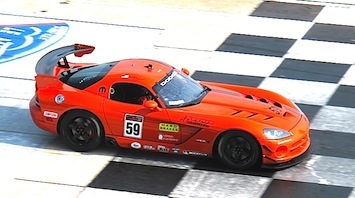Testimonials
Essential for Production Race Cars
Winning Tech for Dodge Viper Cup

I remember the days in the 80s and 90s, when one of the key skills in driving a production race car was keeping from bending your brake pad backers. ...
Read More ->
Winning Tech for Dodge Viper Cup

Another Dodge Viper Cup win for us! Thanks for the heat shields! The brakes were working overtime with 100 lbs of rewards weight on the car (and also...
Read More ->
Specials

DPF7876 Titanium Brake Shim for Alcon, Mitsubishi EVO FQ
$97.99
Sale: $68.59
Special: 30% off
Sale: $68.59
Special: 30% off
Track Wisdom
Why kind of titanium do you use?
Hard Brakes uses only the best available Titanium alloy for our brake heat shields. We use exclusively the 6AL-4V alloy (sometimes called "Grade 5"), which is actually a combination of Titanium blended with Aluminum and Vanadium. This specific alloy is chosen for its excellent thermal protection, light weight, structural integrity and resistance to corrosion. This 6AL/4V Titanium alloy provides far better thermal protection than other metal shim materials, and give roughly twice as much thermal protection as Stainless Steel. Thermal protection of our 6AL4V Titanium is 6 times better than other steels (like the stock backing plate on brake pads), and 30 times better than the Aluminum used in most brake caliper and piston constructions. Our Grade 5 Titanium is long lasting for use and reuse as you replace your brake pads, your heat shields should last you for as long as you own your car.
Beware of imitators offering lower grade titanium alloys, such as the inexpensive CP (Commercially Pure) titanium or Grade 2 titanium. These other types of titanium alloy, while cheaper to manufacture, do not provide the same levels of thermal protection and resistance to corrosion.
Beware of imitators offering lower grade titanium alloys, such as the inexpensive CP (Commercially Pure) titanium or Grade 2 titanium. These other types of titanium alloy, while cheaper to manufacture, do not provide the same levels of thermal protection and resistance to corrosion.











